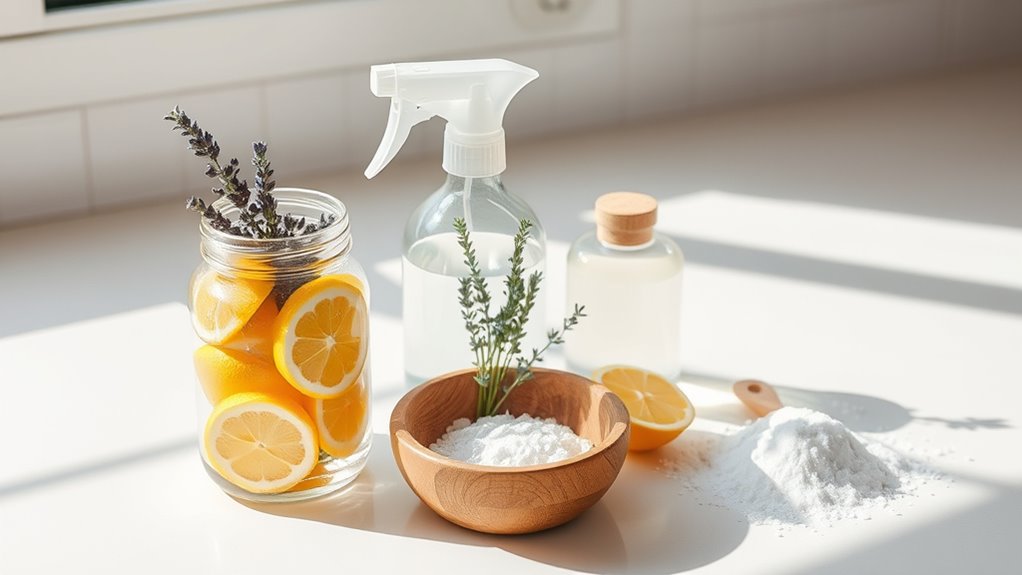Natural cleaning supplies can truly disinfect your home when used correctly. Ingredients like vinegar, citrus, hydrogen peroxide, and essential oils such as tea tree have proven antimicrobial properties that kill germs and bacteria. These eco-friendly options are safe, affordable, and reduce chemical exposure. Proper application and contact time are key to effectiveness. Keep exploring to discover how to make the most of these natural disinfectants for a cleaner, safer space.
Key Takeaways
- Use vinegar or hydrogen peroxide solutions, which effectively kill bacteria and viruses when applied correctly and with proper contact time.
- Incorporate essential oils like tea tree, lemon, or eucalyptus for natural antimicrobial properties in cleaning routines.
- Combine citrus peels or lemon juice with vinegar to boost disinfectant power safely and naturally.
- Use homemade recipes such as diluted rubbing alcohol or baking soda and lemon mixtures for reliable disinfection.
- Ensure proper storage, application, and contact time to maximize the effectiveness of natural disinfectants.
Understanding Natural Disinfectants and Their Effectiveness
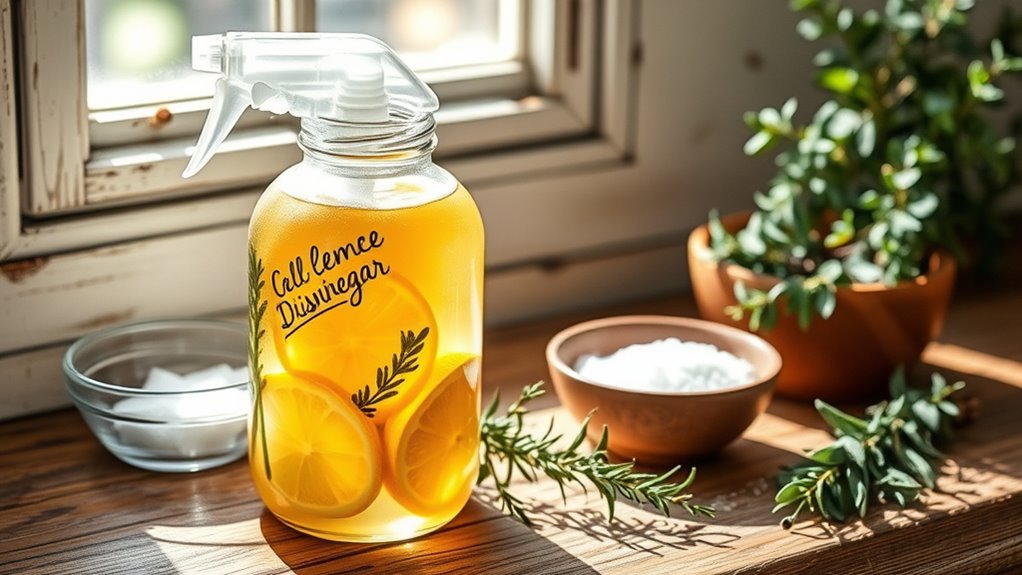
Although natural disinfectants may not always match the potency of chemical cleaners, many plant-based solutions can effectively reduce germs and bacteria when used correctly. These solutions often work through chemical interactions that disrupt microbial cell walls or denature proteins, making them capable of killing bacteria and viruses. Unlike chemical cleaners, natural disinfectants tend to have a lower environmental impact, as they degrade more easily and contain fewer toxic residues. This reduces pollution and minimizes harm to aquatic life. Additionally, studies on HEPA filtration demonstrate how proper air cleaning methods can further enhance indoor air quality and reduce airborne pathogens. However, their effectiveness depends on proper application and concentration. While they may require longer contact times, many natural options, such as vinegar or hydrogen peroxide, offer a safer, eco-friendly alternative for disinfecting surfaces without compromising health or the environment.
Essential Oils With Antimicrobial Properties
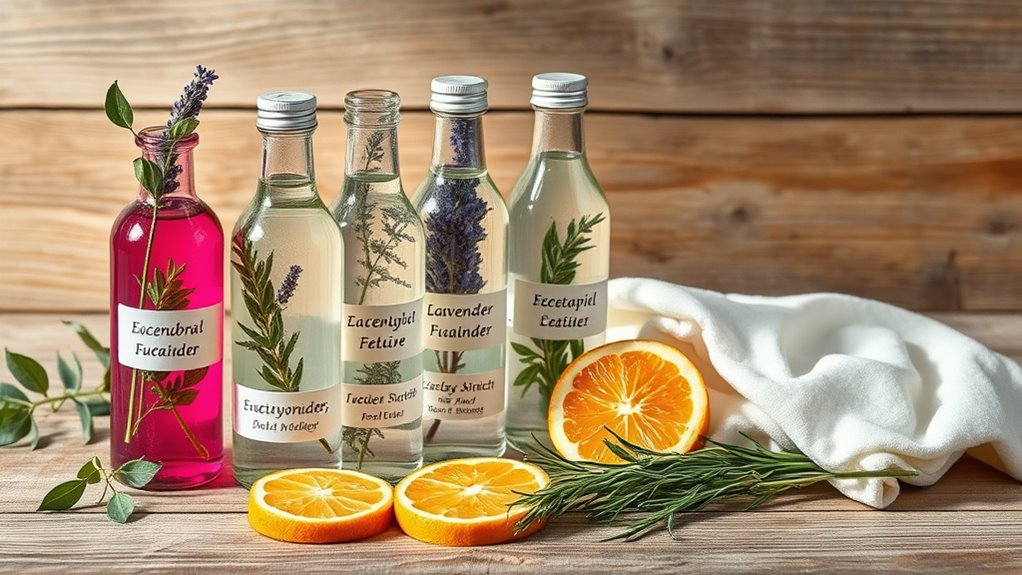
Have you ever considered using essential oils as natural antimicrobial agents? They’re powerful and versatile, making them a popular choice for cleaning. Many essential oil blends contain antimicrobial properties that help eliminate bacteria and viruses. Plus, they offer aromatherapy benefits, creating a pleasant cleaning environment. Incorporating these essential oils into your cleaning routine boosts effectiveness while providing aromatic benefits. Their natural properties make them a safe, eco-friendly alternative to harsh chemicals, helping you disinfect confidently and enjoy a cleaner space. AI safety measures continue to advance, ensuring that such natural solutions can be integrated with confidence and reliability.
Vinegar and Its Role in Natural Disinfection

Vinegar has become a popular natural disinfectant due to its acetic acid content, which effectively kills many bacteria and viruses. When using vinegar for cleaning, it’s important to prioritize vinegar safety by avoiding mixing it with bleach or other harsh chemicals, which can create harmful fumes. To keep your vinegar effective, store it in a cool, dark place in a tightly sealed container to prevent evaporation and degradation. Proper storage tips also include keeping it out of reach of children and pets. While vinegar is a versatile disinfectant, remember it’s not suitable for all surfaces, such as natural stone or hardwood. Understanding proper cleaning techniques ensures you get the cleaning power without risking damage or safety hazards.
Hydrogen Peroxide: A Powerful Natural Cleaner
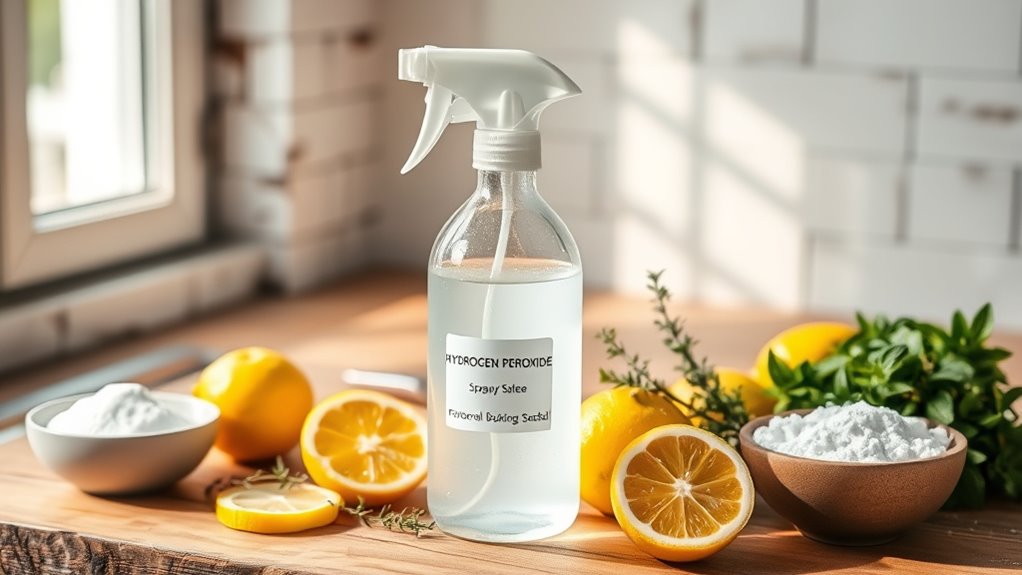
Hydrogen peroxide is a powerful natural cleaner that effectively kills bacteria, viruses, and mold without harsh chemicals. It’s a versatile disinfectant you can use around your home, reducing reliance on synthetic cleaners. Plus, hydrogen peroxide has a minimal environmental impact when used correctly, breaking down into water and oxygen. You can use it to sanitize countertops, bathroom fixtures, and even cutting boards. Be sure to store it properly, as it can lose potency over time. When applying, spray or pour directly onto surfaces and let it sit for a few minutes before wiping. Remember, using hydrogen peroxide responsibly helps protect the environment while maintaining a clean, germ-free space. Its safety and effectiveness make it a top natural cleaning choice. Proper storage and application are essential to maintain its disinfectant properties, ensuring it remains effective over time.
Using Lemon and Citrus for Germ Control
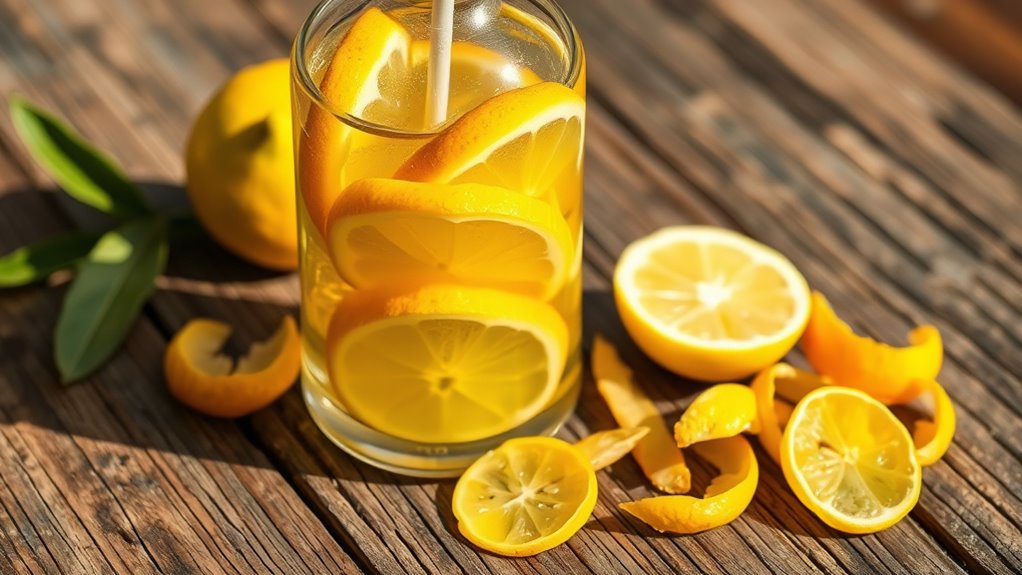
Lemon and other citrus fruits have natural antimicrobial properties that can help reduce germs around your home. Their fresh scent also acts as a disinfectant, making cleaning more pleasant. Just remember to use citrus safely and in proper dilution to get the best germ-fighting benefits. Incorporating citrus into your cleaning routine aligns with natural cleaning supplies that are effective and environmentally friendly.
Citrus’s Natural Antimicrobial Power
Did you know that citrus fruits like lemons and oranges naturally combat germs? Their high acidity and essential oils make them powerful antimicrobial agents. The citrus peel benefits extend beyond flavoring uses; they contain compounds that inhibit bacteria and fungi. When you use citrus in your cleaning routine, you’re harnessing these natural properties to disinfect surfaces effectively. Citrus’s antimicrobial power comes from compounds like limonene, which boost germ-fighting abilities. You can also enjoy the fresh scent while cleaning, thanks to citrus’s natural antibacterial qualities. Incorporating citrus peel benefits into your natural cleaning supplies offers a safe, eco-friendly way to reduce germs without harsh chemicals. Additionally, proper storage of citrus peels can prolong their antimicrobial effectiveness and prevent spoilage. Whether in sprays or homemade wipes, citrus’s natural antimicrobial power helps keep your home clean and fresh.
Lemon’s Fresh Disinfectant Qualities
Have you ever wondered how a simple lemon can act as a powerful disinfectant? Lemon’s natural acidity and fresh scent make it an excellent germ fighter. The citric acid in lemon juice kills bacteria and viruses effectively. Using lemon zest or citrus peels boosts this disinfectant power, as they contain concentrated oils with antimicrobial properties. You can make a natural cleaner by soaking citrus peels in vinegar, creating a potent disinfectant. Plus, lemon’s fresh aroma leaves your space smelling clean and bright. Here’s a quick overview:
| Ingredient | Benefits | Usage Tips |
|---|---|---|
| Lemon zest | Contains essential oils with disinfectant | Add to cleaners or vinegar |
| Citrus peels | Rich in antimicrobial compounds | Infuse in vinegar or water |
| Lemon juice | Natural antibacterial agent | Use directly on surfaces |
| Lemon zest & peels | Boost cleaning power | Use together for best results |
| Vinegar infusion | Disinfects and deodorizes | Soak citrus peels in vinegar |
It is also important to store citrus peels properly to maintain their disinfectant qualities over time.
Incorporating Citrus Safely
To incorporate citrus safely into your cleaning routine, it is vital to understand proper handling and storage methods. First, always wash citrus fruits thoroughly to reduce fruit pesticide residues, which can pose health risks. Store citrus in a cool, dry place away from direct sunlight to maintain freshness and prevent spoilage. Use organic options when possible for better citrus safety. When extracting juice or zest, wear gloves to avoid skin irritation. Avoid using citrus peels on delicate surfaces that can be damaged by acid. Consider diluting citrus extracts to prevent potential surface damage. Keep citrus-based cleaners out of reach of children and pets. Additionally, understanding the relationship between citrus and health can help you make informed choices about its use in your cleaning routine. By following these steps, you guarantee effective germ control while minimizing risks associated with fruit pesticide residues.
The Benefits of Tea Tree Oil as a Natural Disinfectant
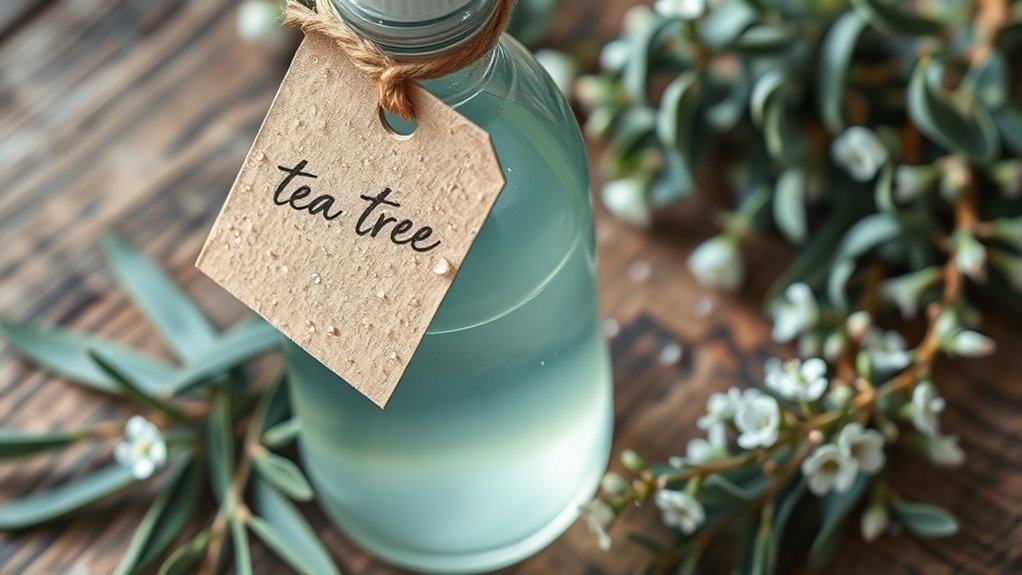
Tea tree oil stands out as a powerful natural disinfectant thanks to its proven antimicrobial properties. As an essential oil, tea tree effectively kills bacteria, fungi, and viruses, making it a versatile choice for cleaning. Unlike synthetic disinfectants, it’s gentle on surfaces and safe around your family when used properly. You can add a few drops of tea tree to your cleaning solutions for a natural boost of disinfecting power. Its antimicrobial benefits are well-documented, so you can feel confident that you’re reducing germs without harsh chemicals. Using tea tree oil as part of your cleaning routine not only keeps your home sanitized but also leverages the natural potency of essential oils for a healthier environment. Incorporating effective disinfectant options like tea tree oil ensures a safer and more eco-friendly cleaning experience.
Homemade Natural Disinfectant Recipes for Your Home
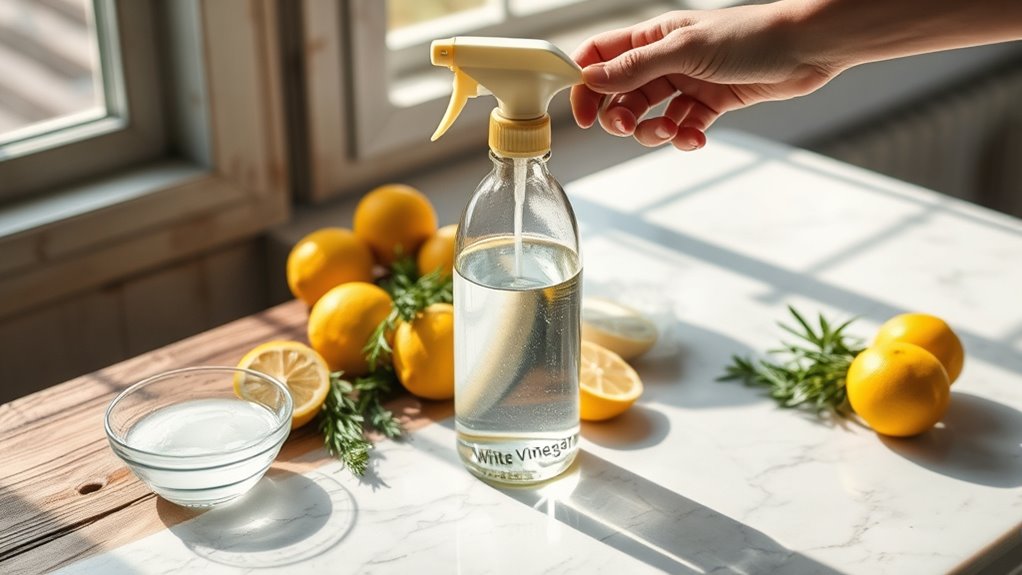
Creating your own natural disinfectant at home is a simple and effective way to keep your living space clean and safe. By avoiding synthetic chemicals found in many commercial cleaners, you reduce exposure to potential toxins. Plus, homemade recipes are budget-friendly and customizable.
Try these effective solutions:
- Mix white vinegar with water for a powerful, natural cleaner.
- Combine lemon juice and baking soda for a fresh-smelling disinfectant.
- Use rubbing alcohol (70% or higher) for quick sanitizing.
- Add tea tree oil to water for antimicrobial properties.
- Create a hydrogen peroxide solution for surfaces needing deeper disinfection.
These recipes help you avoid harmful chemicals and rely on natural ingredients, making your home safer without sacrificing cleanliness.
Frequently Asked Questions
Are Natural Disinfectants Safe for Children and Pets?
You’re wondering if natural disinfectants are safe for children and pets. Generally, yes, pet safe cleaning and child friendly disinfectants are formulated to be gentle yet effective, reducing harmful chemicals. Always read labels to make sure they’re free from toxic ingredients and follow usage instructions. Natural options like vinegar, tea tree oil (diluted), or plant-based sprays are safer choices. Still, it’s best to keep children and pets away until surfaces dry.
How Long Do Natural Disinfectants Take to Kill Germs?
When asking how long natural disinfectants take to kill germs, remember that chemical efficacy depends on contact time. Generally, you should let the solution sit for at least 1 to 10 minutes to effectively eliminate bacteria and viruses. Natural disinfectants often require a longer contact time than chemical ones, so be patient and guarantee the surface stays wet during this period for ideal results.
Can Natural Cleaning Supplies Replace Commercial Disinfectants Entirely?
You wonder if natural cleaning supplies can fully replace commercial disinfectants. While natural ingredients like vinegar and tea tree oil offer some disinfectant effectiveness, they may not eliminate all germs as quickly or thoroughly as chemical disinfectants. For everyday cleaning, they work well, but for high-risk areas, relying solely on natural options might not be enough. Always assess your needs, and consider combining natural ingredients with other safety practices for ideal protection.
Do Natural Disinfectants Leave Any Harmful Residues?
Think of natural disinfectants as gentle guardians, but they aren’t perfect shields. You might wonder if they leave harmful residues. Generally, natural options prioritize residue safety, minimizing chemical residues that can linger and cause concerns. While they’re safer than many commercial disinfectants, some natural ingredients could still leave trace amounts. Always follow usage instructions to guarantee your surfaces stay safe and residue-free, keeping your home healthy and clean.
How Often Should I Use Natural Disinfectants in My Home?
You should consider the frequency of use for disinfectants based on your household’s needs, especially in high-touch areas. Natural disinfectants work effectively, but their effectiveness timeline may be shorter than chemical options. Typically, using them daily or every few days is enough to maintain cleanliness without overuse. Adjust the frequency according to how often surfaces are touched, ensuring you keep your home safe and disinfected effectively.
Conclusion
Natural disinfectants may lack the industrial strength of chemicals, but their gentle power often surpasses expectations. While they won’t produce the same harsh fumes or residue, they still effectively combat germs with fewer risks. It’s a reminder that sometimes, the simplest ingredients—like lemon or vinegar—can be more potent than you think. Embrace these natural options, and you’ll find cleanliness doesn’t have to come at the expense of safety or health.
